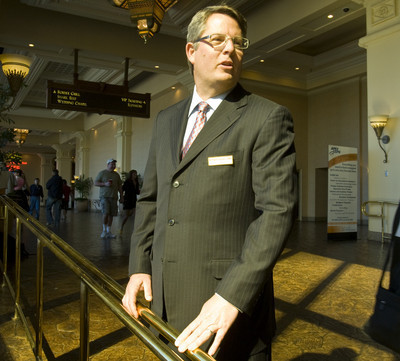Don’t cancel, work with us
MILWAUKEE -- Hotel companies long steadfast in requiring business clients to forfeit deposits when they cancel or scale back events, are starting to soften their stance.
The approach in Las Vegas is much the same even though Las Vegas is a different business model, said Richard Harper, Mandalay Bay's vice president of sales and marketing. Las Vegas resort revenues are based on a number of areas, not just the dollars earned through room sales. A customer that doesn't come to town for an event not only isn't paying for the room, that person isn't gambling in the casino, spending money in the shops or eating in one of the resort's restaurants.
"The simple answer is if a group contracts for 1,000 and brings in 500, we're thrilled and give those 500 people the best experience possible," Harper said. "This city lives and dies by the occupied rooms."
Harper said resorts would much rather have half the number of promised attendees than have a group cut a check and not show up.
Las Vegas Sands Corp. has a similar conciliatory attitude.
Sands Corp. operates more than 2 million square feet of meeting and convention facilities between The Venetian and Palazzo. Company spokesman Ron Reese said the convention sales staff will work with groups that might not make their contracted attendance figures.
"Where appropriate, if we can secure outward year commitments, such as re-signing the group or meeting for 2011 or 2012," Reese said.
Whether businesses are worried about being seen as big spenders in these lean times or they just don't have enough participants signed up to make an event worth holding, they are finding hotel officials increasingly willing to negotiate on room rates, catering bills and even cancellation penalties.
"Being in the service industry, it's in our nature to always find a win-win," said Cassy Scrima, marketing director at Marcus Hotels and Resorts, which owns the Pfister Hotel in downtown Milwaukee. "We understand the predicament people are in, and as a hotel you want that repeat business to come back to you."
In good times, hotel companies usually charge a hefty fee when a client wants to cancel an event, said C. Patrick Scholes, an analyst with Friedman, Billings, Ramsey & Co. in Arlington, Va., sometimes as much the event's full cost. But the tough economy is forcing them to reconsider.
"We're seeing where people may go to the properties and say they want to cancel, and the companies say, 'Don't cancel, we'll cut you a better deal,' " Scholes said. "Something is better than nothing. Right now hotels have lower bargaining power due to the economy."
A hefty enough penalty can convince planners to conduct the event even with low attendance, said Robert LaFleur, an analyst with the Susquehanna Financial Group in Stamford, Conn.
"It might make more sense to pay the full amount and hold the event than to do nothing and still take a financial hit," he said.
But forcing clients into such a position can make them angry. So hotels like Mandalay Bay are offering clients the option of moving an event to a less busy season or applying whatever penalty they pay toward a future booking, Harper said.
"Every negotiation is with an eye toward future business with that customer," Harper said. "So we'll be flexible. We're not going to turn our back on a customer just because of the economic downturn."

















